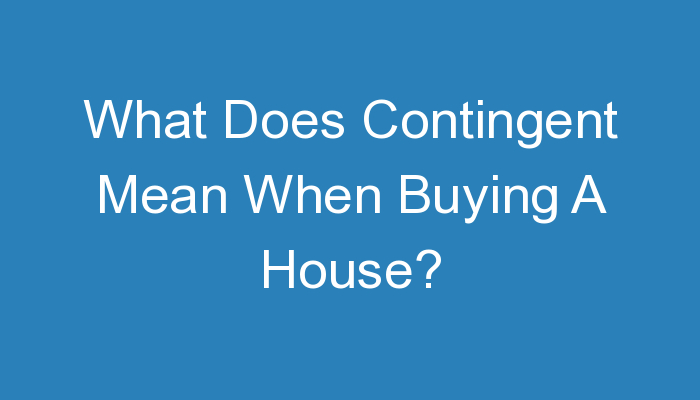Buying a house is one of the biggest decisions you will ever make in your life. It involves an incredible amount of research, paperwork and money. But what does contingent mean when it comes to buying a house?
In this blog post, we’ll explore the concept of contingencies when it comes to purchasing a home. From understanding what a contingency is and why it’s important to knowing how to create a solid contingency plan for yourself, read on to learn more about this important part of the home-buying process.
What is a contingent offer?
A contingent offer is an agreement between a potential buyer and seller in which the sale of the property is contingent upon the buyer’s ability to obtain financing or meet some other agreed-upon condition. This type of offer is often used when the buyer needs to sell their current home in order to purchase the new one.
Why do people make contingent offers?
Making a contingent offer on a home means that your offer is dependent or contingent upon something else happening first. Most often, this something else is the sale of your current home.
There are several reasons why people might make a contingent offer:
1. They might not have enough money for a down payment on the new home if they have to sell their current home first.
2. Their current home might be worth less than they owe on it, so they need to sell it in order to have enough money for a down payment on the new home.
3. They might not want to move into their new home until their current home is sold because they can’t afford two mortgages at once.
4. They might want to move into their new home right away and use the proceeds from the sale of their old home to pay off the mortgage on the new one.
What are the risks of making a contingent offer?
There are a few risks to making a contingent offer when buying a house. The first is that the seller may accept another, non-contingent offer. This could leave you without a home and out of luck. Additionally, if your contingencies are not met, you may end up forfeiting your earnest money deposit. Finally, if the market shifts and prices go up while your contingencies are being met, you may end up paying more for the home than you would have otherwise.
How can you protect yourself when making a contingent offer?
When making a contingent offer on a home, there are a few things you can do to protect yourself. First, be sure to get pre-approved for a mortgage. This will show the sellers that you are serious about buying the home and that you have the financial means to do so. Secondly, make sure your offer is contingent upon a home inspection.
This way, you can be sure that the home is in good condition and that there are no major repairs needed. Lastly, be sure to have a loan contingency in your offer. This will give you the peace of mind knowing that if something happens and you are unable to get financing for the home, you can back out of the deal without penalty.
Conclusion
In summary, when buying a house it is important to understand the meaning of contingent. Contingent indicates that a contract has been made but not fully completed or accepted yet. It can be used to protect buyers and sellers until all contingencies have been satisfied before closing on a house deal. By understanding what contingency means and how it affects your real estate purchase, you will be better prepared in making an informed decision when purchasing a home.

